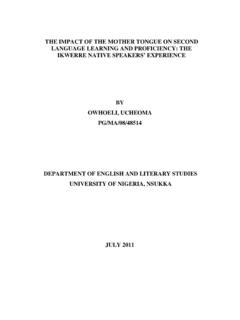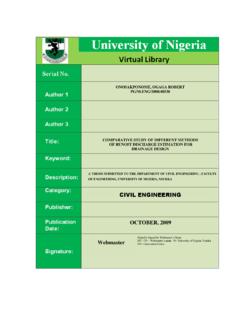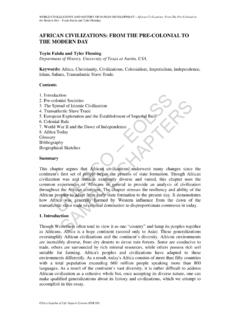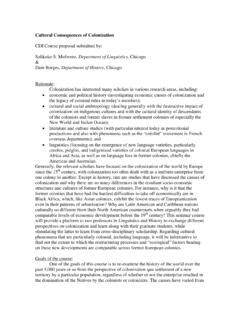Transcription of THE IMPACT OF THE MOTHER TONGUE ON ... - University of …
1 I THE IMPACT OF THE MOTHER TONGUE ON SECOND. LANGUAGE LEARNING AND PROFICIENCY: THE. IKWERRE NATIVE SPEAKERS' EXPERIENCE. BY. OWHOELI, UCHEOMA. PG/MA/08/48514. DEPARTMENT OF ENGLISH AND LITERARY STUDIES. University OF NIGERIA, NSUKKA. JULY 2011. i TITLE PAGE. THE IMPACT OF THE MOTHER TONGUE ON SECOND LANGUAGE. LEARNING AND PROFICIENCY: THE IKWERRE NATIVE. SPEAKERS'EXPERIENCE. A RESEARCH PROJECT. SUBMITTED TO THE DEPARTMENT OF ENGLISH AND LITERARY. STUDIES, FACULTY OF ARTS, University OF NIGERIA, NSUKKA. IN PARTIAL FULFILMENT OF THE REQUIREMENTS FOR THE. AWARD OF MASTERS OF ARTS DEGREE IN ENGLISH. BY. OWHOELI, UCHEOMA. PG/MA/08/48514. JULY 2011. ii APPROVAL PAGE. This project report has been approved for the Department of English and Literary Studies, University of Nigeria Nsukka.
2 By _____ _____. Dr. Chinyere Prof. A. N. Akwanya Supervisor Head of Department iii CERTIFICATION. This is to certify that this research study The IMPACT of The MOTHER TONGUE on Second Language Learning and Proficiency: The Ikwerre Native Speakers'. Experience , has been satisfactorily carried out by OWHOELI UCHEOMA, a post graduate student in the Department of English and Literary Studies and with registration number PG/MA/08/48514. The work embodied in this thesis is original and has not been submitted in part or full for any other diploma or degree of this University or any other University . _____ _____. Dr. Chinyere Prof. A. N. Akwanya Supervisor Head of Department _____. _____. External Supervisor Prof. E. E. Okafor Dean of Faculty iv DEDICATION.
3 This work is dedicated to my parents' Mr. and Mrs. Peter W. Owhoeli, whose unending love, support and encouragement has given me the zeal to pursue a master's degree. You're one in a million! v ACKNOWLEDGEMENTS. I am most grateful to Almighty God for the gift of life, his sustaining grace, steadfast love and abundant mercies that are new every morning. With a heart full of gratitude, I thank my supervisor Dr. Chinyere L. Ngonebu, for her directions, patience and encouragement without which this project would not have been a success. My appreciation goes to Mr. Woji Okajile for providing me with material on Ikwerre language and to Mr. Gloria Worukwo and Dr. Daniel Ogum for their academic advice which also gave me insight to this project work.
4 My appreciation also goes to all my lecturers for their motivational and inspirational lectures which gave me a better understanding in my course of study. My thanks goes to my brothers: Ovutor and Amarachi, my sisters: Aleruchi, Chisegum and Chinwevudu for their love, encouragement and prayers during my period of study in UNN. I am very grateful to my colleagues and friends for the brotherly love they've shown me during my period of study in UNN: Charity, Emmanuel, Ifeoma, Judith, Josephine, Ndidi, Chinyere and Edwin. Finally, I am also using this medium to appreciate my pastor Rev. and Mrs. Abisimo Okanlanwo for their prayers and encouragement. vi ABSTRACT. Several factors affect the learning and proficiency of a second language and among them is the culture , age, environment, method of acquisition, nature and structure of the first language and the amounts of efforts invested.
5 This research work investigates the IMPACT of the MOTHER TONGUE Ikwerre on the learning and proficiency of the target language. The research was carried out using the JSS. one and JSS two students of some selected secondary schools in Emohua Local Government Area of Rivers State, where Ikwerre is an indigenous language and is mostly used in communication outside the classroom. Written composition/utterances of the students were the instrument for data collection. The findings of the data analysis yielded categories viz, vowel harmony/. nasalization, phonemic differences, insertion of vowels between consonant clusters, wrong placement of stress, wrong use of tenses, omission/wrong use of rules of concord and wrong use of prepositions.
6 From the results of the research, it was found that the MOTHER TONGUE Ikwerre' influences the learning and proficiency of the English language. These findings were discussed and thereafter, conclusion and recommendation were deduced. vii TABLE OF CONTENTS. Title Page ..i Approval Page ..ii Certification ..iii Dedication ..iv Acknowledgements ..v Abstract .vi Table of Contents vii CHAPTER ONE: INTRODUCTION. Background of the Study . 1. Statement of the Problem .. 5. Purpose of the Study ..7. Significance of the Study ..7. Research Questions ..7. Research Design and Methodology ..8. Scope of the Study ..8. CHAPTER TWO: LITERATURE REVIEW. Conceptual Framework .10. MOTHER - TONGUE ..10. Second Language .11. Second Language Learning and Proficiency.
7 12. The Origin of the Ikwerre People ..13. The culture of the Ikwerre People ..15. The Geographical Location ..16. viii The Ikwerre Language ..17. Classification of Ikwerre Language ..18. The Origin of the Target Language (English) .. 24. English Language in Nigeria 28. English Language in Ikwerre ..28. Theoretical Framework ..29. The Behaviourist Theory .. 29. The Cognitive Theory ..32. Stephen Krashen Theory of SLA ..34. Related Empirical Study ..36. Summary of Literature ..46. CHAPTER THREE: RESEARCH DESIGN AND PROCEDURE. Introduction ..49. Research Design . 49. Area of Study ..50. Populations ..50. Sampling Technique ..51. Research Instrument ..51. Method of Data Analysis ..51. CHAPTER FOUR: DATA ANALYSIS AND INTERPRETATION. Introduction.
8 53. Research Question No. 1 ..53. Research Question No. 2 ..58. CHAPTER FIVE: DISCUSSION OF FINDINGS, CONCLUSION. AND RECOMMENDATION. Discussion of Findings ..62. Conclusion .. 65. ix Implications of the Study ..66. Organizing Seminars on Ikwerre Language for Teachers within the Region ..66. Allotting More Time to the Teaching of Oral English .. 66. Motivation of Students by Teachers .. 66. Recommendation for Further Studies ..67. Works Cited ..68. Appendix .. 76. 1. CHAPTER ONE. INTRODUCTION. Introduction of the Background Learning a second language has been important to human beings from earliest historical times. The Encyclopedia of Language and Linguistics states that the Sumerians of the third millennium BC used bilingual tablets in Sumerian and Akkadian to educate their children, and compiled the world's oldest known bilingual dictionaries.
9 Bilingual tablets were used in ancient Egypt, and, in the Ptolemaic period, the upper classes in Egypt received their education in Greek. In the Hellenistic period, the majority of people in Asia Minor who could read and write did so in Greek, their second language. Until the fourth century BC, bilingual education in Greek and Latin was an important part of the curriculum for Roman children (3742). In line with this, Otagburuagu states that second language learning could arise from a social or political factor. For instance, colonization, trade and commerce could create a conducive atmosphere for the development of a second language (1). He continued by saying that the colonization of Nigeria, Ghana etc by Britain must be seen as the primary factor that gives rise to the adoption of the English language as the second language in these countries.
10 Multilingualism as well as the desire for social integration could give rise to second language learning too (Otagburuagu 1). In support of this view, Verghese also states that it is a historical accident that led to English taking deep roots in Canada, Australia and the United States (Verghese 1). He further states that history again has played a part in English being used widely in other countries in Africa and Asia. Those countries were the colonies of Great Britain, and since the day they came under Britain rule, English has been taught and used as a medium of communication there (Verghese 1). 2. Apart from colonization, other possible reason(s) why English is mostly used as a second language is that it is spoken around the globe and has wider dispersion than any other language.










